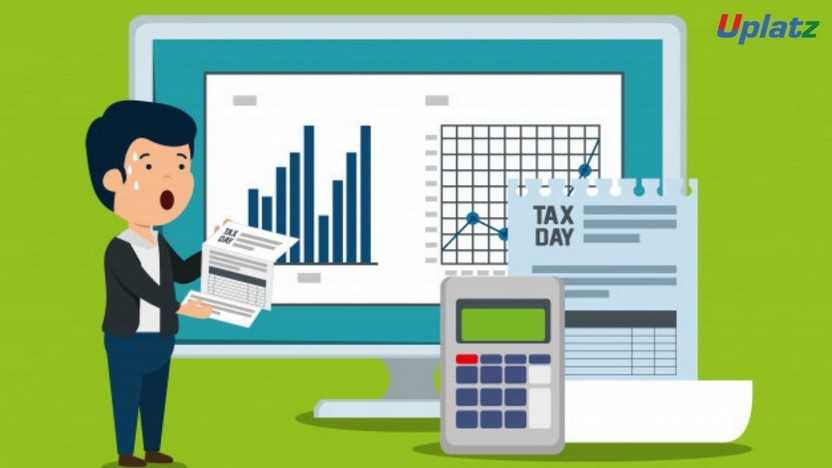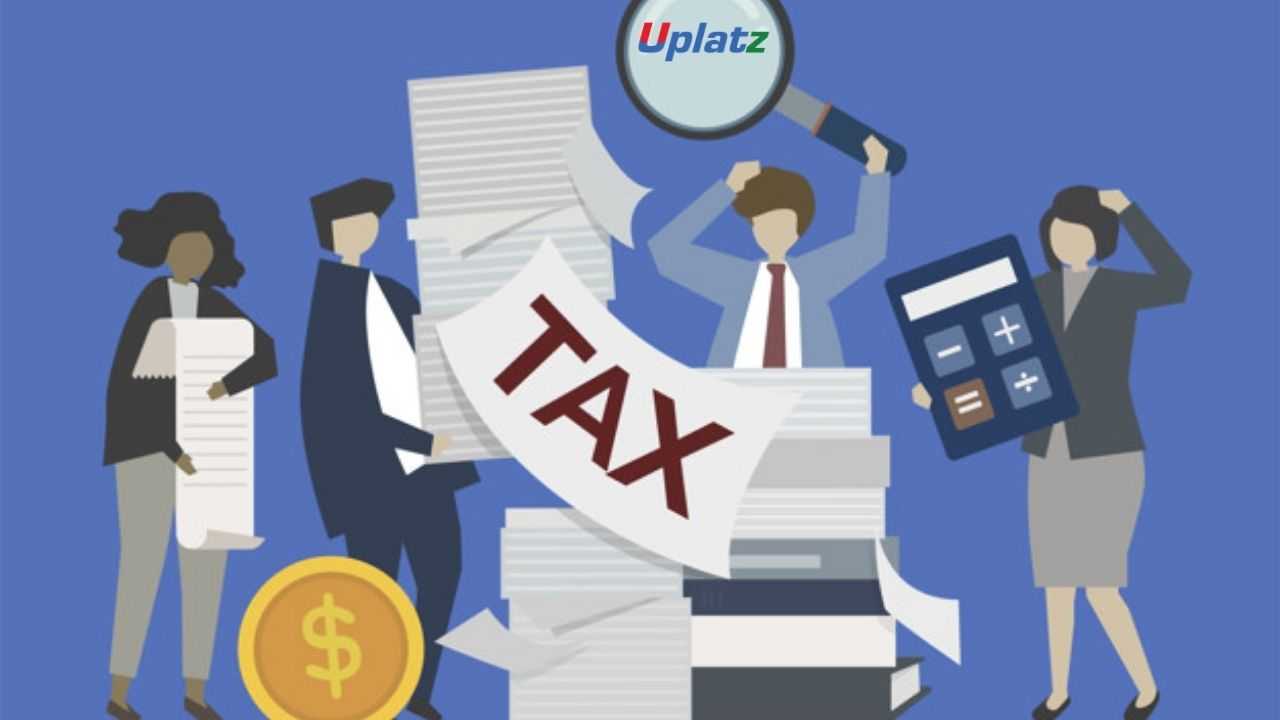GST (Goods and Services Tax)
Learn GST from Basic to Advanced level covering legal aspects, major compliances, amendments, precautions to minimize disputes & more.Preview GST (Goods and Services Tax) course
View Course Curriculum Price Match Guarantee Full Lifetime Access Access on any Device Technical Support Secure Checkout Course Completion Certificate 90% Started a new career
BUY THIS COURSE (
90% Started a new career
BUY THIS COURSE (GBP 12 GBP 29 )-
 96% Got a pay increase and promotion
96% Got a pay increase and promotion
Students also bought -
-

- Income Tax (India)
- 160 Hours
- GBP 12
- 302 Learners
-

- Career Path - Financial Analyst
- 350 Hours
- GBP 32
- 453 Learners
-

- Tax Deducted at Source (TDS) - Income Tax India
- 3 Hours
- GBP 29
- 92 Learners

The main objective of incorporating the GST was to eliminate tax on tax, or double taxation, which cascades from the manufacturing level to the consumption level.
The Goods and Services Tax (GST) is a uniform indirect tax levied on goods and services across the country. GST, as an umbrella tax, replaced central taxes like central excise, service tax, additional duties of excise & customs, special additional duty of customs, besides cesses and surcharges, on supply of goods and services.
GST envisages all transactions and processes to be done only through the electronic mode, to achieve a non-intrusive administration. This minimizes the taxpayer's physical interaction with tax officials. GST provides for the facility of auto-populated monthly returns and annual return. It also facilitates taxpayers by prescribing grant of refund within 60 days, and provisional release of 90 per cent refund to exporters within 7 days. Further facilitation measures include interest payment if refund is not sanctioned in time, and refund to be directly credited to bank accounts. Comprehensive transitional provisions for ensuring smooth transition of existing taxpayers to GST regime, credit for available stocks, etc. Other provisions include system of GST compliance rating, etc.
This Course offered by Uplatz, covers GST from Basic to Advanced level covering legal aspects, major compliances, amendments, precautions to minimize disputes with the GST department, Handling assessments.
Course/Topic - GST - all lectures
-
1 - Introduction to GST in India - part 1
-
2 - Introduction to GST in India - part 2
-
3 - Introduction to GST in India - part 3
-
4 - Supply under GST - Intro and Definition - part 1
-
5 - Supply under GST - part 2
-
6 - Supply under GST - part 3
-
7 - Supply under GST - part 4
-
8 - Supply under GST - part 5
-
9 - Charge of GST - part 1
-
10 - Charge of GST - part 2
-
11 - Charge of GST - part 3
-
12 - Charge of GST - part 4.1
-
13 - Charge of GST - part 4.2
-
14 - Charge of GST - part 5
-
15 - Exemptions from GST - part 1.1
-
16 - Exemptions from GST - part 1.2
-
17 - Exemptions from GST - part 2.1
-
18 - Exemptions from GST - part 2.2
-
19 - Exemptions from GST - part 3
-
20 - Exemptions from GST - part 4
-
21 - Exemptions from GST - part 5
-
22 - Exemptions from GST - part 6
-
23 - Place of Supply - Intro & Definition
-
24 - Place of Supply - Sections 10 & 11
-
25 - Place of Supply - Section 12 - part 1
-
26 - Place of Supply - Section 12 - part 2
-
27 - Place of Supply - Section 13
-
28 - Time of Supply - Intro & Definition
-
29 - Time of Supply - Section 12
-
30 - Time of Supply - Section 13
-
31 - Time of Supply - Section 14
-
32 - Value of Supply - Intro & Definition
-
33 - Provisions for Valuation of Supply
-
34 - Rules for Valuation of Supply - part 1
-
35 - Rules for Valuation of Supply - part 2
-
36 - Input Tax Credit - Intro & Definition
-
37 - Apportionment of Blocked Credits
-
38 - Blocked Credit in Special Circumstances - Section 18
-
39 - Blocked Credits - part 1
-
40 - Blocked Credits - part 2
-
41 - Distribution of Credit by ISD - Sections 20 & 21
-
42 - Input Tax Credit - Section 16
-
43 - Registration - Intro & Definition
-
44 - Registration - Section 22
-
45 - Registration - Sections 23 & 24
-
46 - Registration - Section 25 - part 1
-
47 - Registration - Section 25 - part 2
-
48 - Registration - Sections 26 to 30 and Rules
-
49 - Tax Invoice - Definition & Section 31
-
50 - eInvoicing
-
51 - Tax Invoice - Special Cases - part 1
-
52 - Tax Invoice - Special Cases - part 2
-
53 - Credit and Debit Notes
-
54 - Accounts and Records - part 1
-
55 - Accounts and Records - part 2
-
56 - Electronic Way Bill - part 1
-
57 - Electronic Way Bill - part 2.1
-
58 - Electronic Way Bill - part 2.2
-
59 - Electronic Way Bill - part 3
-
60 - Payment of Tax - Intro & Definition
-
61 - Payment of Tax - Section 49
-
62 - Payment of Tax - Section 50
-
63 - Returns - Intro & Definition - part 1
-
64 - Returns - part 2
-
65 - Returns - part 3
-
66 - Returns - part 4
-
67 - Returns - part 5
-
68 - Import and Export under GST - Intro & Definition
-
69 - Import of Goods under GST
-
70 - Import of Services under GST
-
71 - Registration and ITC in case of Import of Goods and Services
-
72 - Export under GST
-
73 - Refunds - part 1
-
74 - Refunds - part 2.1
-
75 - Refunds - part 2.2
-
76 - Refunds - part 3
-
77 - Refunds - part 4
-
78 - Refunds - part 5.1
-
79 - Refunds - part 5.2
-
80 - Job Work - part 1
-
81 - Job Work - part 2
-
82 - Assessment and Audit - part 1
-
83 - Assessment and Audit - part 2
-
84 - Inspection - Search - Seizure - Arrest - part 1
-
85 - Inspection - Search - Seizure - Arrest - part 2
-
86 - Demands and Recovery - Intro & Definition
-
87 - Demands and Recovery - Sections 73 & 74
-
88 - Demands and Recovery - Section 75
-
89 - Demands and Recovery - Sections 76 & 77
-
90 - Demands and Recovery - Sections 78 to 84
-
91 - Liability to Pay in Certain Cases
-
92 - Offences and Penalties - Intro & Definition - Sections 122 & 123
-
93 - Offences and Penalties - Sections 124 & 130
-
94 - Offences and Penalties - Sections 131 & 138 and Rules
-
95 - Advance Ruling
-
96 - Appeals and Revision - part 1
-
97 - Appeals and Revision - part 2
-
98 - Appeals and Revision - part 3
-
99 - Appeals and Revision - part 4
-
100 - TDS (Tax Deduction at Source) and TCS (Tax Collection at Source)
-
101 - Miscellaneous Provisions - part 1
-
102 - Miscellaneous Provisions - part 2
-
103 - Miscellaneous Provisions - part 3
-
104 - Miscellaneous Provisions - part 4
To enable the students to learn the concepts indirect tax and GST from the pre-GST period to post- GST period.
● To understand the importance of indirect taxes (GST) in the Indian and global economy and its contribution to the economic development.
● To comprehend the principles of taxations, objectives of taxes and its impact, shifting and incidence process of indirect taxes in the market orientated economy.
● To understand the implications of GST on the taxable capacity consumers, dealers and of the society at large and its changes.
● To make them to be a tax consultant in preparing the tax planning, tax management. Payment of tax and filing of tax returns.
GST (Goods and Services Tax) – Course Syllabus
• GST Levy
• GST Time of Supply
• GST Place of Supply
• Transitional problems
• Input Tax Credit
• GST Valuation
• GST Returns
• GST Registration
• GST Payment
• GST Assessment
• GST Refund
• GST Penalties
• GST Offences
• GST Advance Ruling
• GST FTP
• GST Customs Duty
• GST Ethical Practice
The GST (Goods and Services Tax) Certification ensures you know planning, production and measurement techniques needed to stand out from the competition.
The goods and services tax (GST) is a tax on goods and services sold domestically for consumption. The tax is included in the final price and paid by consumers at point of sale and passed to the government by the seller. The GST is a common tax used by the majority of countries globally.
GST, or Goods and Services Tax, is an indirect tax imposed on the supply of goods and services. It is a multi-stage, destination-oriented tax imposed on every value addition, replacing multiple indirect taxes, including VAT, excise duty, service taxes, etc
Goods and Service Tax (GST) is paid by the consumers for the products or services. But the GST will be remitted to the government by the businesses who are providing you with those products and services.
The GST training is a comprehensive guide to the Goods and Service Tax regulations. The EduPristine GST course covers the practical aspects of Good and Service Tax (GST) including registration, returns and in-depth accounting and recording of GST transactions.
Uplatz online training guarantees the participants to successfully go through the GST (Goods and Services Tax) Certification provided by Uplatz. Uplatz provides appropriate teaching and expertise training to equip the participants for implementing the learnt concepts in an organization.
Course Completion Certificate will be awarded by Uplatz upon successful completion of the GST (Goods and Services Tax) online course.
The GST (Goods and Services Tax) draws an average salary of $115,000 per year depending on their knowledge and hands-on experience.
Any person willing to become GST practitioner can enroll by making application in FORM GST PCT-
1 to the authorized officer; After examining the eligibility, Authorized Officer will issue the certificate in FORM GST PCT
2The ICAI provides two GST courses, a Certificate Course, and an Advanced Certificate Course on GST.
Note that salaries are generally higher at large companies rather than small ones. Your salary will also differ based on the market you work in.
GST & Taxation.
GST Executive.
Accounts Executive.
Tax Analyst.
Q1. What are the taxes that were in place instead of GST?
Many indirect taxes were levied which are now replaced by GST. They are
· Central Excise Duty
· Countervailing Duty
· Service Tax
· Special Countervailing Duty
· Central Sales Tax (CST)
· Post Graduate Program in GST
· Value Added Tax (VAT)
· Entertainment Tax
· Octroi
· Entry Tax
· Taxes on lotteries
· Advertisement taxes
· Purchase Tax
· Luxury Tax
Q.2 What do you understand by the remission of tax/duty?
It means that the taxpayer is free from the obligation to pay tax on goods in case they are lost or destroyed because of natural causes. Some conditions also apply as per the law and rules under remission.
Q.3 What is Reverse Charge Mechanism(RCM)? Does it apply only to services?
Reverse Charge Mechanism is a mechanism under GST, wherein the usual cycle of tax payment is reversed.
No, reverse charge mechanism is applied to both, supply of services and goods.
Q.4 Can the working government exempt supplies from levying GST under the model GST Law?
Yes. There is a provision under the Model GST Law’s section 10, the Central or State Government, can exempt the supplies from the levy of GST based on the recommendation of the GST council in general or subject to conditions.
Q.5 What does a taxable event under GST mean?
A taxable event is an event that takes place for the tax to be levied – CGST & SGST will be levied on intra-state supplies; IGST will be levied on inter-state supplies.
Q.6 What does GST Credit mean?
If input GST is higher than the output GST, then it is called the GST Credit. It is calculated differently for different types of GST.
Q.7 How would you differentiate between CGST, SGST and IGST?
1. CGST stands for Central Goods and Services Tax. CGST is levied on sales within the State and is collected by Central Government. CGST replaces taxes like Central Excise and Service tax
2. SGST ( State Goods and Services Tax) is levied on local sales within State and is collected by State Government. SGST will replaces taxes like VAT, Entertainment tax and Luxury tax
3. IGST (Interstate Goods and Services Tax) is levied on central sales, that is sales out of state. This is collected by Central Government as Interstate Supply of Goods and Services. IGST replaces taxes like CST(Central Sales Tax).
Q.8 What is meant by Input GST?
GST on purchase is called Input GST.
Q.9 What is payable GST?
The difference between the Output GST and Input GST is the GST payable.
Q.10 What is the limit for registration in GST?
The limit for registration in GST is Rs. 20 Lacs. In case the turnover is more than 20 lacs or likely to go beyond 20 lacs, then compulsory registration in GST is applicable.
The turnover includes
1. Taxable Sales
2. Exempt Sales
3. Export Sales
4. Interstate Sales
5. Sales by Agent of Principal
Q.11 Are all goods, services covered under GST?
Except for a particular list of exempted items, all other goods and services come under the GST. It is the most comprehensive indirect tax in the Indian economy.
Q.12Where is GST collected?
The GST is collected at the point wherever the sale is made, so that there is no confusion about when it has to be paid. Earlier different taxes were collected at different stages of the business process so there was a tax at every step such as manufacturing, sale and even when goods were moved from one place to the other. Under the GST all of these are eliminated making it easy for all in the supply chain.
Q.13 How does one file a GST Return Online?
GST return can be filed online on the GST Portal. You need to be registered under GST and have the 15 digit GST identification number which is based on your state code and PAN.









